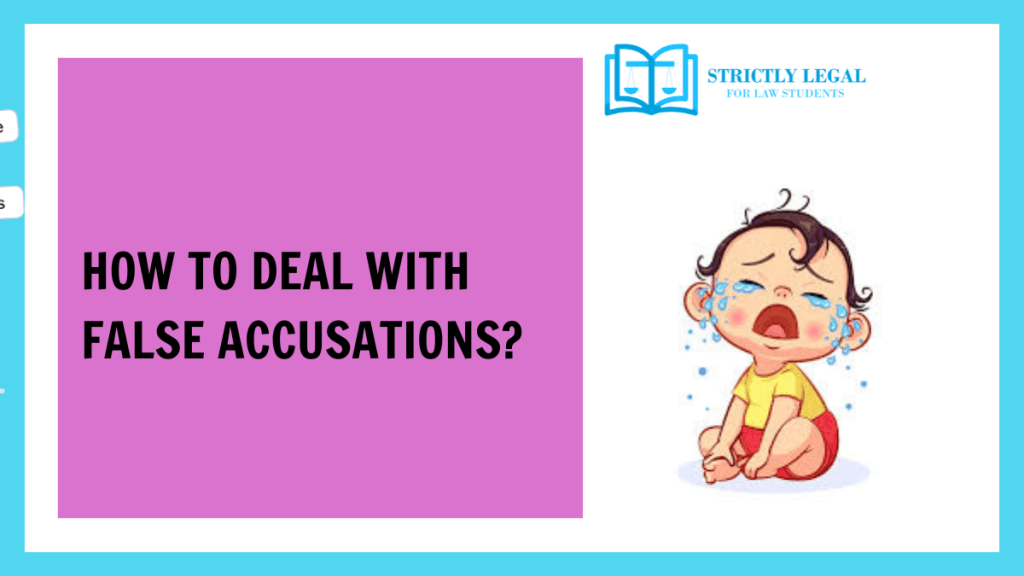As the name implies, false allegations are any statement, opinion, or material made about someone that has no supporting evidence or is known to be untrue and is meant to inflict pain or defamation. False accusations in court result in vexatious and malicious litigations that frequently waste the courts’ valuable time and the judicial apparatus in addition to harming the victim’s reputation and causing them to deal with other problems.
The rule of law in India states that everyone is presumed innocent until proven guilty. This has led to the position that any prosecution or accusation against an individual will only be accepted as true if it has been proven beyond a reasonable doubt and there is no reason for an adjudicator to believe the allegation is false. Nevertheless, no law in India has specifically established harsh penalties for making untrue accusations against a person.
It can be a devastating experience for anyone. Whether it’s in a personal, professional, or legal setting, being wrongfully accused of something you didn’t do can harm your reputation, your career, and even your freedom. If you’re facing false accusations, it’s crucial to take steps to protect yourself both legally and emotionally. In this article, we’ll explore the steps you should take when dealing with false accusations in a legal context.
Keeping Composure and Collecting Evidence
The first step when falsely accused is to remain as calm as possible. It’s easy to get emotionally overwhelmed in such situations, but acting impulsively or aggressively can make things worse. Instead, focus on gathering any evidence that might help disprove the accusation. Evidence could include:
Witnesses:
Speak to people who were present during the alleged incident to provide testimony supporting your version of events.
Alibi:
If you were elsewhere when the accusation supposedly occurred, gather any documentation or witnesses that can verify your whereabouts.
Documents:
Any records, photos, or texts that contradict the claims so made by the other party can be essential to prove your innocence in front of the Hon’ble Court. Keep a detailed record of every interaction related to the false accusation. This includes conversations, emails, texts, or any documents related to the case. Even if these communications don’t seem significant at the moment, they could become valuable pieces of evidence later. Remember to keep all correspondence related to the accusation safe and organized.
Physical Evidence:
In some cases, tangible evidence (like surveillance footage) may be crucial in clearing your name.
Avoid Public Statements:
If you’re publicly accused of something, it’s important to avoid making public statements or defending yourself in the media or on social media. Anything you say in a public forum could be misinterpreted or used against you in court. In the age of social media, it’s easy to make a hasty post or comment, but this could damage your case. Let your lawyer guide you on the best way to respond.
Consider Counterclaims:
In some cases, if you are falsely accused, you may have grounds to file a counterclaim against the person who made the accusation. This could be for defamation, emotional distress, or other damages caused by the false accusation. Your lawyer can help you determine whether pursuing a counterclaim is appropriate for your situation.
Legal Actions Against False Allegations In India
There are various recourses that can be used to counter legal actions against false allegations in India which are as follows:
Seeking an Anticipatory Bail :
In order to avoid being arrested on the basis of a false allegation, the victim of a false allegation in India should first request anticipatory bail from the closest court that has the authority to grant it in the event that a First Information Report (FIR) is filed against them. Section 438 of the Code of Criminal Procedure (Section 482 BNSS retains the concept of anticipatory bail) permits anticipatory bail to be granted prior to an arrest. In addition to helping the victim avoid an arrest, which could result in severe mental suffering and reputational damage, requesting anticipatory bail also gives him the opportunity to better prepare for his defense.
Quashing of the First Information Report:
By submitting an application under Section 482 (Now Section 582 BNSS) of the Code of Criminal Procedure, the High Court of the relevant state can quashed a false accusation or complaint in the form of a FIR. The court has the inherent authority to guarantee the purposes of justice by issuing the necessary orders. The accused must, however, prove a number of things, such as that the act or omission of the accused against which the allegation has been made does not amount to an offense, that the incident claimed in the complaint never happened, that the accusations are unfounded and were made out of personal animosity, etc.
Provisions of the Indian Penal Code, 1860:
According to Section 209 of the Indian Penal Code (Chapter XIV of BNS) , anyone who makes a false claim in a court of justice with the intent to harm or annoy another person, dishonestly, or fraudulently, faces up to two years in prison and a fine. The court has sufficient authority to utilize these laws to punish the offender if it determines that the integrity and integrity of the legal system have been violated. Furthermore, anyone who believes that a criminal conspiracy is being established could be used against him in the future may also invoke section 120B of the Indian Penal Code (Section 61 of BNS).
Provisions of the Indian Evidence Act, 1872:
Concrete proof is required in order to support any claim in a court of law. According to Section 193 of the Indian Evidence Act, anyone who willfully fabricates or submits false evidence that could be used in any stage of legal proceedings faces a maximum sentence of seven years in prison and a fine. Second, anyone who uses or attempts to utilize fake evidence by passing it off as authentic will face the same penalties as if they had provided false testimony, according to Section 196 of the Evidence Act.
Conclusion
Dealing with false accusations is never easy, but knowing how to respond legally can make all the difference. Stay calm, gather evidence, consult a lawyer, and avoid taking matters into your own hands. By following the right steps, you can protect your reputation, your rights, and your future. No one should have to suffer from wrongful accusations, and with the right legal strategy, you can fight to clear your name.
If you find yourself in this unfortunate situation, don’t hesitate to contact a legal professional to guide you through the process and ensure that your rights are fully protected.

Law student.
Turning legal insights into engaging narratives.





